关于房地产的英语文章
缓解房地产的压力英语作文
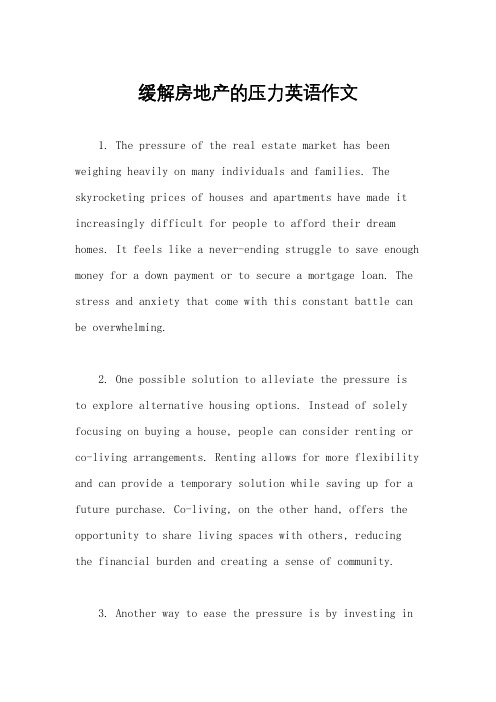
缓解房地产的压力英语作文1. The pressure of the real estate market has been weighing heavily on many individuals and families. The skyrocketing prices of houses and apartments have made it increasingly difficult for people to afford their dream homes. It feels like a never-ending struggle to save enough money for a down payment or to secure a mortgage loan. The stress and anxiety that come with this constant battle can be overwhelming.2. One possible solution to alleviate the pressure is to explore alternative housing options. Instead of solely focusing on buying a house, people can consider renting or co-living arrangements. Renting allows for more flexibility and can provide a temporary solution while saving up for a future purchase. Co-living, on the other hand, offers the opportunity to share living spaces with others, reducing the financial burden and creating a sense of community.3. Another way to ease the pressure is by investing inreal estate in less expensive areas. Instead of solely looking at properties in major cities or popular neighborhoods, expanding the search to suburban or rural areas can yield more affordable options. While this may require a longer commute or a change in lifestyle, it can provide a much-needed relief from the intense competition and high prices in urban centers.4. Government intervention and policies can also play a crucial role in alleviating the pressure on the real estate market. Implementing stricter regulations on property speculation and increasing the supply of affordable housing can help stabilize prices and create a more balanced market. Additionally, providing financial incentives or tax breaks for first-time homebuyers can make purchasing a home more accessible and less burdensome.5. Finally, it is important for individuals to manage their expectations and prioritize their needs when it comes to buying a home. It is easy to get caught up in the desire for a larger, more luxurious property, but it is essentialto consider what is truly necessary and affordable. Bybeing realistic about one's financial situation and considering options that may not meet the ideal image of a dream home, the pressure can be significantly reduced.In conclusion, the pressure of the real estate market can be overwhelming, but there are various ways toalleviate it. Exploring alternative housing options, investing in less expensive areas, implementing government policies, and managing expectations can all contribute to a more balanced and less stressful housing market.。
房地产的英语作文
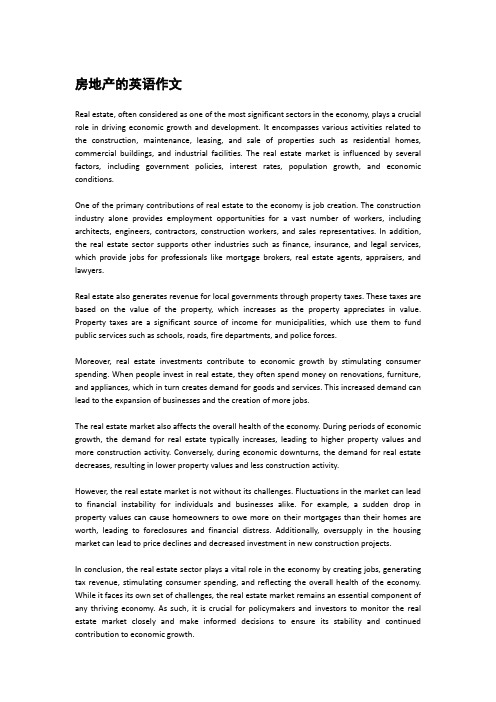
房地产的英语作文Real estate, often considered as one of the most significant sectors in the economy, plays a crucial role in driving economic growth and development. It encompasses various activities related to the construction, maintenance, leasing, and sale of properties such as residential homes, commercial buildings, and industrial facilities. The real estate market is influenced by several factors, including government policies, interest rates, population growth, and economic conditions.One of the primary contributions of real estate to the economy is job creation. The construction industry alone provides employment opportunities for a vast number of workers, including architects, engineers, contractors, construction workers, and sales representatives. In addition, the real estate sector supports other industries such as finance, insurance, and legal services, which provide jobs for professionals like mortgage brokers, real estate agents, appraisers, and lawyers.Real estate also generates revenue for local governments through property taxes. These taxes are based on the value of the property, which increases as the property appreciates in value. Property taxes are a significant source of income for municipalities, which use them to fund public services such as schools, roads, fire departments, and police forces.Moreover, real estate investments contribute to economic growth by stimulating consumer spending. When people invest in real estate, they often spend money on renovations, furniture, and appliances, which in turn creates demand for goods and services. This increased demand can lead to the expansion of businesses and the creation of more jobs.The real estate market also affects the overall health of the economy. During periods of economic growth, the demand for real estate typically increases, leading to higher property values and more construction activity. Conversely, during economic downturns, the demand for real estate decreases, resulting in lower property values and less construction activity.However, the real estate market is not without its challenges. Fluctuations in the market can lead to financial instability for individuals and businesses alike. For example, a sudden drop in property values can cause homeowners to owe more on their mortgages than their homes are worth, leading to foreclosures and financial distress. Additionally, oversupply in the housing market can lead to price declines and decreased investment in new construction projects.In conclusion, the real estate sector plays a vital role in the economy by creating jobs, generating tax revenue, stimulating consumer spending, and reflecting the overall health of the economy. While it faces its own set of challenges, the real estate market remains an essential component of any thriving economy. As such, it is crucial for policymakers and investors to monitor the real estate market closely and make informed decisions to ensure its stability and continued contribution to economic growth.。
房地产的英语作文
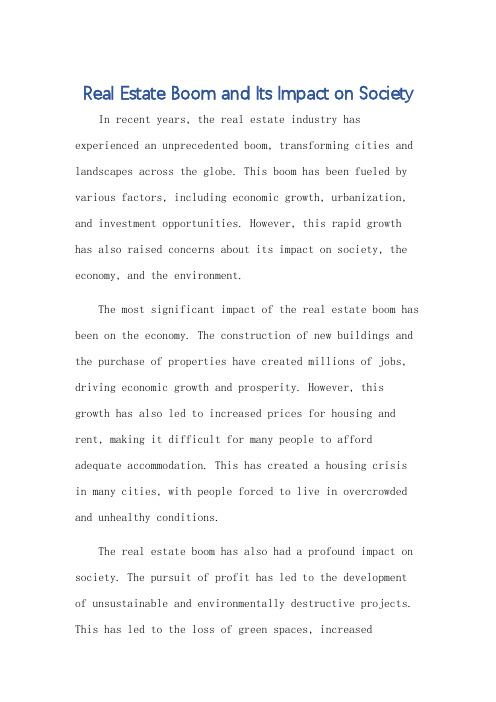
Real Estate Boom and Its Impact on Society In recent years, the real estate industry has experienced an unprecedented boom, transforming cities and landscapes across the globe. This boom has been fueled by various factors, including economic growth, urbanization, and investment opportunities. However, this rapid growth has also raised concerns about its impact on society, the economy, and the environment.The most significant impact of the real estate boom has been on the economy. The construction of new buildings and the purchase of properties have created millions of jobs, driving economic growth and prosperity. However, this growth has also led to increased prices for housing and rent, making it difficult for many people to afford adequate accommodation. This has created a housing crisisin many cities, with people forced to live in overcrowded and unhealthy conditions.The real estate boom has also had a profound impact on society. The pursuit of profit has led to the development of unsustainable and environmentally destructive projects. This has led to the loss of green spaces, increasedpollution, and a decline in the quality of life for many people. Furthermore, the concentration of wealth in the hands of a few has created a divide between the rich and the poor, leading to social tension and inequality.However, the real estate boom has also presented opportunities for innovation and positive change. The development of smart cities and green buildings has the potential to address the housing crisis and improve the quality of life for people. These projects aim to create sustainable and inclusive cities that provide affordable housing, green spaces, and infrastructure for all.In conclusion, the real estate boom has had both positive and negative impacts on society. While it has driven economic growth and created jobs, it has also led to housing crises, environmental degradation, and social inequality. It is crucial that we carefully consider the long-term impacts of real estate development and strive to create sustainable and inclusive cities that benefit everyone.**房地产繁荣及其对社会的影响**近年来,房地产行业经历了前所未有的繁荣,改变了全球的城市和景观。
房产的英语作文
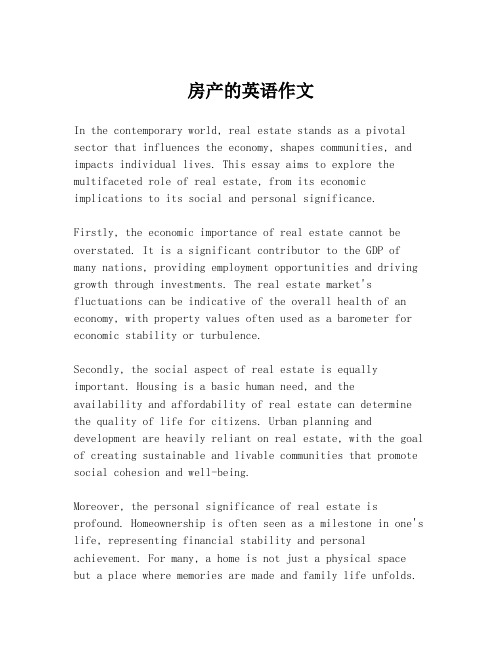
房产的英语作文In the contemporary world, real estate stands as a pivotal sector that influences the economy, shapes communities, and impacts individual lives. This essay aims to explore the multifaceted role of real estate, from its economic implications to its social and personal significance.Firstly, the economic importance of real estate cannot be overstated. It is a significant contributor to the GDP of many nations, providing employment opportunities and driving growth through investments. The real estate market's fluctuations can be indicative of the overall health of an economy, with property values often used as a barometer for economic stability or turbulence.Secondly, the social aspect of real estate is equally important. Housing is a basic human need, and theavailability and affordability of real estate can determine the quality of life for citizens. Urban planning and development are heavily reliant on real estate, with the goal of creating sustainable and livable communities that promote social cohesion and well-being.Moreover, the personal significance of real estate is profound. Homeownership is often seen as a milestone in one's life, representing financial stability and personal achievement. For many, a home is not just a physical space but a place where memories are made and family life unfolds.However, the real estate industry also faces challenges suchas housing shortages, speculative pricing, and the environmental impact of construction. Addressing these issues requires innovative solutions and responsible practices to ensure that the sector remains sustainable and accessible.In conclusion, real estate is a cornerstone of modern society, with far-reaching effects on the economy, social structure, and individual lives. As we look to the future, it is crucial to navigate the complexities of the real estate market with foresight and responsibility, ensuring that it continues to serve the needs of society as a whole.。
英文作文有关 地产
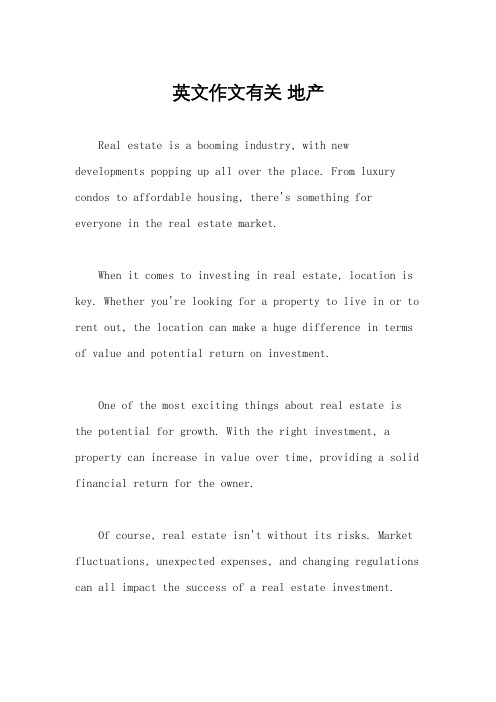
英文作文有关地产Real estate is a booming industry, with new developments popping up all over the place. From luxury condos to affordable housing, there's something for everyone in the real estate market.When it comes to investing in real estate, location is key. Whether you're looking for a property to live in or to rent out, the location can make a huge difference in terms of value and potential return on investment.One of the most exciting things about real estate is the potential for growth. With the right investment, a property can increase in value over time, providing a solid financial return for the owner.Of course, real estate isn't without its risks. Market fluctuations, unexpected expenses, and changing regulations can all impact the success of a real estate investment.For those looking to buy a home, real estate can be a source of stress and anxiety. The process of finding the right property, securing financing, and navigating thelegal and logistical aspects of a real estate transaction can be overwhelming.On the other hand, for those looking to sell a property, real estate can be an opportunity to make a profit and move on to the next chapter of their lives.Overall, real estate is a dynamic and complex industry that offers a wide range of opportunities and challengesfor investors, homeowners, and developers alike. Whetheryou're buying, selling, or investing, real estate is an industry that's always changing and evolving.。
当代房产情况简介英文作文
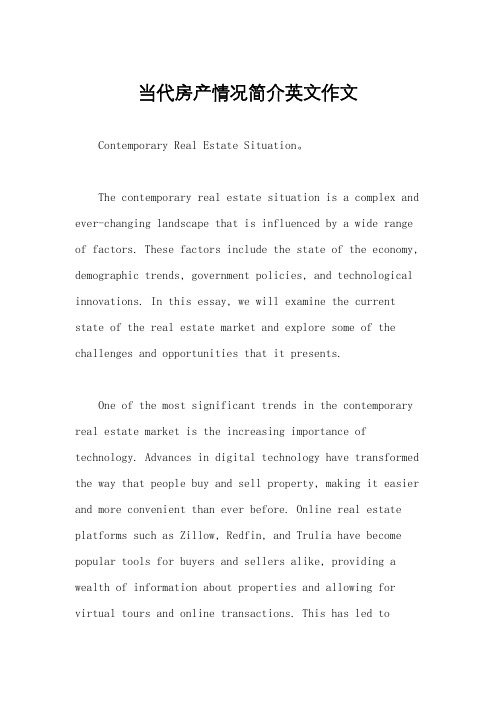
当代房产情况简介英文作文Contemporary Real Estate Situation。
The contemporary real estate situation is a complex and ever-changing landscape that is influenced by a wide range of factors. These factors include the state of the economy, demographic trends, government policies, and technological innovations. In this essay, we will examine the current state of the real estate market and explore some of the challenges and opportunities that it presents.One of the most significant trends in the contemporary real estate market is the increasing importance of technology. Advances in digital technology have transformed the way that people buy and sell property, making it easier and more convenient than ever before. Online real estate platforms such as Zillow, Redfin, and Trulia have become popular tools for buyers and sellers alike, providing a wealth of information about properties and allowing for virtual tours and online transactions. This has led toincreased competition in the market and has made it easier for buyers to find properties that meet their needs.Another trend that is shaping the contemporary real estate market is the changing demographics of the population. As the baby boomer generation ages, there is a growing demand for housing that is accessible and affordable for seniors. At the same time, younger generations are looking for more flexible and affordable housing options, such as co-living and micro-apartments. These demographic shifts are creating new opportunities for developers and investors who are able to meet the changing needs of the market.However, the contemporary real estate market also presents a number of challenges. One of the biggest challenges is the affordability crisis that is affecting many cities around the world. Rising housing costs are making it increasingly difficult for people to buy or rent homes, particularly in urban areas where demand is high. This has led to a growing divide between those who can afford to live in desirable neighborhoods and those who arepriced out of the market.Another challenge facing the real estate market is the impact of government policies and regulations. In some cases, government policies can help to stimulate the market by providing incentives for developers and investors. However, in other cases, regulations can be a barrier to entry, making it difficult for new players to enter the market or for existing players to expand their operations.Despite these challenges, the contemporary real estate market remains a dynamic and exciting field, with opportunities for growth and innovation. As the market continues to evolve, it will be important for developers, investors, and policymakers to stay informed about the latest trends and to adapt their strategies accordingly. By doing so, they will be better positioned to succeed in this rapidly changing landscape.。
房地产-英语作文

房地产-英语作文The real estate industry has always been a hot topic, especially in recent years with the rapid development of urbanization. Many people are eager to invest in real estate, hoping to make a profit. However, the real estate market is not always stable, and there are many factorsthat can affect it.One of the biggest factors that can affect the real estate market is the economy. When the economy is strong, people have more money to invest in real estate, and the demand for housing increases. On the other hand, when the economy is weak, people may not have the money to invest in real estate, and the demand for housing may decrease.Another factor that can affect the real estate market is government policies. Government policies can have a significant impact on the real estate market, such as tax policies, interest rates, and regulations. For example, if the government raises interest rates, it can make it moredifficult for people to obtain mortgages, which can decrease the demand for housing.Location is also an important factor to consider when investing in real estate. The location of a property can affect its value and demand. For example, properties located in urban areas may have higher demand and value than those in rural areas.The condition of the property is also an important factor to consider. Properties that are in good condition and well-maintained may have higher value and demand than those that are in poor condition.In conclusion, the real estate market is affected by various factors such as the economy, government policies, location, and condition of the property. It is important to consider these factors when investing in real estate to make informed decisions and minimize risks.。
房地产 英语作文
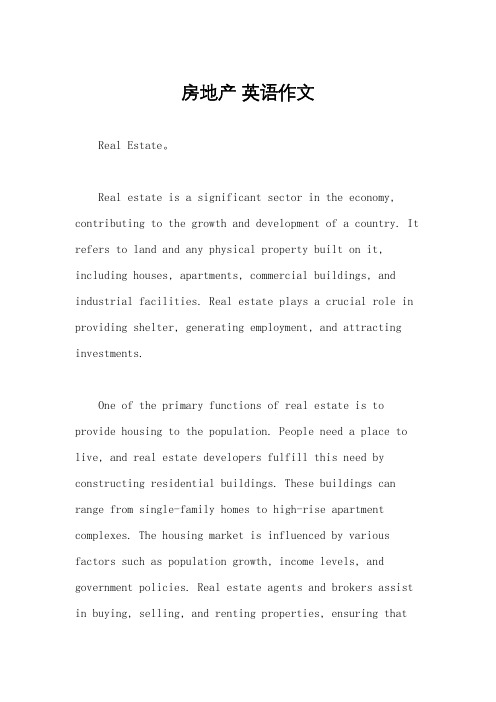
房地产英语作文Real Estate。
Real estate is a significant sector in the economy, contributing to the growth and development of a country. It refers to land and any physical property built on it, including houses, apartments, commercial buildings, and industrial facilities. Real estate plays a crucial role in providing shelter, generating employment, and attracting investments.One of the primary functions of real estate is to provide housing to the population. People need a place to live, and real estate developers fulfill this need by constructing residential buildings. These buildings can range from single-family homes to high-rise apartment complexes. The housing market is influenced by various factors such as population growth, income levels, and government policies. Real estate agents and brokers assist in buying, selling, and renting properties, ensuring thatindividuals find suitable homes.Apart from housing, real estate also encompasses commercial properties. These properties are used for business purposes, such as offices, retail stores, hotels, and restaurants. Commercial real estate is an essential component of the economy as it provides spaces for various industries to operate. The demand for commercial properties is influenced by economic factors, market trends, and location. Investors and businesses carefully analyze the potential of a commercial property before making any decisions.Real estate also includes industrial properties, such as factories, warehouses, and distribution centers. These properties are crucial for manufacturing and logistics operations. Industrial real estate is often located in areas with good transportation infrastructure to facilitate the movement of goods. Industrial properties are in high demand due to the growth of e-commerce and the need for efficient supply chains.The real estate sector has a significant impact on the economy. It creates employment opportunities in construction, property management, sales, and related industries. Real estate development stimulates economic growth by attracting investments and generating revenue. It also contributes to the tax base of a country, which can be used for infrastructure development and public services.However, the real estate market is subject to fluctuations. It can experience booms and busts, influenced by factors such as interest rates, economic conditions, and government policies. During a real estate boom, property prices rise rapidly, leading to speculation and investment. On the other hand, during a bust, property values decline, leading to financial challenges for homeowners and investors.Real estate also faces challenges related to sustainability and environmental impact. Construction and operation of buildings consume significant amounts of energy and resources. However, there is a growing emphasis on sustainable practices in the real estate industry.Developers are incorporating green building techniques, energy-efficient systems, and renewable energy sources to minimize environmental impact.In conclusion, real estate is a vital sector in the economy, providing housing, commercial spaces, and industrial properties. It contributes to economic growth, employment, and investment opportunities. However, it also faces challenges such as market fluctuations and environmental impact. The real estate industry must adapt to changing trends and embrace sustainable practices to ensure a sustainable future.。
- 1、下载文档前请自行甄别文档内容的完整性,平台不提供额外的编辑、内容补充、找答案等附加服务。
- 2、"仅部分预览"的文档,不可在线预览部分如存在完整性等问题,可反馈申请退款(可完整预览的文档不适用该条件!)。
- 3、如文档侵犯您的权益,请联系客服反馈,我们会尽快为您处理(人工客服工作时间:9:00-18:30)。
关于房地产的英语文章
下面是一篇关于房地产的英语文章示例,它讨论了全球房地产市场的一些趋势:
Title: Global Real Estate Market Trends
The global real estate market has been witnessing significant changes ov er the past decade, driven by factors such as urbanization, technological advancements, demographic shifts, and economic policies. Here, we explo re some of the major trends shaping the industry.
1.Urbanization:Rapid urbanization continues to be a key driver of the real estate market. As more people move into cities, demand for ho using, commercial spaces, and infrastructure is increasing. This has led to the development of smart cities, where technology is integrated into ev ery aspect of urban living.
2.Technological Advancements:Technology is transforming the wa y real estate is bought, sold, and managed. Virtual reality tours, online p roperty listings, and blockchain-based transactions are becoming more co mmon, making the process more efficient and transparent. Smart home t echnologies are also gaining popularity, enhancing energy efficiency and security.
3.Demographic Shifts:Changing demographics have a profound i mpact on the real estate market. Aging populations are creating a need
for senior-friendly housing, while younger generations are driving deman d for affordable starter homes and rentals. Additionally, migration pattern s influence the demand for properties in different regions.
4.Economic Policies:Government policies play a crucial role in sha ping the real estate market. Interest rates, tax incentives, zoning regulatio ns, and affordable housing initiatives can either stimulate or dampen de mand. For instance, low interest rates often encourage homebuyers to en ter the market, while higher taxes on investment properties may discoura ge investors.
5.Sustainability and Climate Change:Environmental concerns and climate change are increasingly influencing real estate decisions. Green b uildings that minimize energy consumption and reduce carbon emissions are in high demand. Moreover, properties in areas prone to natural disas ters, such as flooding or wildfires, may face lower valuations due to incre ased risk.
In conclusion, understanding these global real estate market trends is essential for investors, developers, and policymakers alike. By adapting t o these changes, stakeholders can better navigate the evolving landscape and capitalize on emerging opportunities.
请注意,这只是一个示例,可以根据具体的需求进行修改或扩展。
